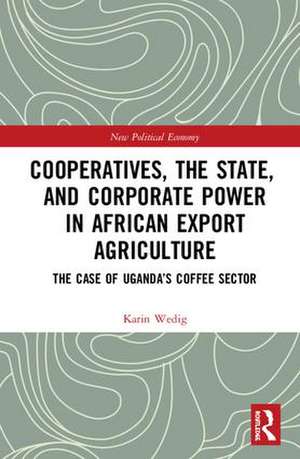Cooperatives, the State, and Corporate Power in African Export Agriculture: The Case of Uganda’s Coffee Sector: New Political Economy
Autor Karin Wedigen Limba Engleză Hardback – 18 mar 2019
The book scrutinizes the neoliberal ideal of economic prosperity arising through the operation of liberalized labor markets by illuminating the discriminatory nature of Uganda’s informal labor relations. It points to the role of cooperatives as a potential instrument of progressive change in African export agriculture, where large numbers of small producers depend on casual wage work in addition to farming. In contrast to the portrayal, advanced by some governments and rarely questioned by donors, of an unproblematic co-existence of small producers’ collective action and big capital interests, the author calls for a re-politicized debate on the Social and Solidarity Economy. As part of this, she highlights the adverse political and economic conditions faced by African cooperatives, including intense international competition in agricultural processing, inadequate access to infrastructure and services, and at times antagonistic state-cooperative relations.
Supported by wide-ranging interdisciplinary evidence, including new ethnographic, survey and interview data, this book shows how cooperatives may be co-opted by both the state and corporations in a discourse that ignores structural inequalities in value chains and emphasizes poverty reduction over economic and political empowerment. It provides a critique of New Institutional Economics as a framework for understanding how institutions shape redistribution, and develops a political economy approach to explore the conditions for structural change in African export agriculture.
Din seria New Political Economy
-
 Preț: 429.44 lei
Preț: 429.44 lei - 18%
 Preț: 145.24 lei
Preț: 145.24 lei -
 Preț: 438.14 lei
Preț: 438.14 lei -
 Preț: 169.79 lei
Preț: 169.79 lei -
 Preț: 442.89 lei
Preț: 442.89 lei -
 Preț: 210.70 lei
Preț: 210.70 lei - 16%
 Preț: 247.87 lei
Preț: 247.87 lei -
 Preț: 416.12 lei
Preț: 416.12 lei -
 Preț: 194.67 lei
Preț: 194.67 lei -
 Preț: 466.45 lei
Preț: 466.45 lei -
 Preț: 463.58 lei
Preț: 463.58 lei - 24%
 Preț: 323.17 lei
Preț: 323.17 lei -
 Preț: 277.69 lei
Preț: 277.69 lei -
 Preț: 367.08 lei
Preț: 367.08 lei -
 Preț: 278.84 lei
Preț: 278.84 lei -
 Preț: 411.98 lei
Preț: 411.98 lei -
 Preț: 194.38 lei
Preț: 194.38 lei -
 Preț: 431.73 lei
Preț: 431.73 lei -
 Preț: 277.87 lei
Preț: 277.87 lei -
 Preț: 387.83 lei
Preț: 387.83 lei
Preț: 1000.27 lei
Preț vechi: 1219.84 lei
-18% Nou
Puncte Express: 1500
Preț estimativ în valută:
191.41€ • 204.67$ • 159.59£
191.41€ • 204.67$ • 159.59£
Carte tipărită la comandă
Livrare economică 17 aprilie-01 mai
Preluare comenzi: 021 569.72.76
Specificații
ISBN-13: 9781138070516
ISBN-10: 1138070513
Pagini: 230
Ilustrații: 1 Line drawings, black and white; 8 Halftones, black and white; 24 Tables, black and white; 9 Illustrations, black and white
Dimensiuni: 156 x 234 x 14 mm
Greutate: 0.45 kg
Ediția:1
Editura: Taylor & Francis
Colecția Routledge
Seria New Political Economy
Locul publicării:Oxford, United Kingdom
ISBN-10: 1138070513
Pagini: 230
Ilustrații: 1 Line drawings, black and white; 8 Halftones, black and white; 24 Tables, black and white; 9 Illustrations, black and white
Dimensiuni: 156 x 234 x 14 mm
Greutate: 0.45 kg
Ediția:1
Editura: Taylor & Francis
Colecția Routledge
Seria New Political Economy
Locul publicării:Oxford, United Kingdom
Public țintă
Postgraduate and UndergraduateCuprins
1. Africa’s Cooperative Revival. 2. Footloose Labor in Uganda’s Coffee Sector. 3. Cooperatives as a Driver of Inclusive Rural Development. 4. Institutional Change for Cooperative Growth. 5. The Socioeconomic Effects of Uganda’s Coffee Cooperatives. 6. Corporate Power in Uganda’s Coffee Sector. 7. Conclusion
Notă biografică
Karin Wedig is the Chief Economist for Africa at the German Society for International Cooperation (GIZ). She holds a PhD from the School of Oriental and African Studies (SOAS), University of London and degrees from the London School of Economics and Political Sciences (LSE) and the University of Cambridge. She has worked as an Assistant Professor of International Political Economy at the Josef Korbel School of International Studies, University of Denver; consulted social and economic reform programs in Sub-Saharan Africa and Southeast Asia and spent more than three years living and working in Uganda as an advisor and researcher.
Descriere
Agriculture contributes more to Africa’s GDP than any other sector, and small farms are the largest food producer and a major source of employment and export earnings. However, productivity remains low and destitution among small producers is widespread. This book explores the strengths and weaknesses of the revival of Africa’s cooperatives.
